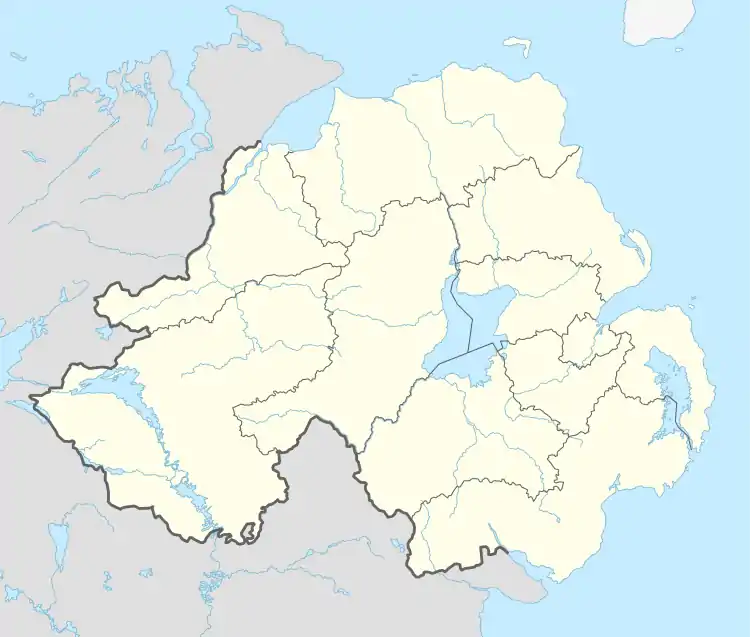Ardstraw
Ardstraw (from Irish: Ard Sratha (hill or height of the holm or strath)[1]) is a small village, townland and civil parish in County Tyrone, Northern Ireland, three miles northwest of Newtownstewart. In the 2001 Census it had a population of 222 people (81 houses).[2]
Ardstraw
| |
|---|---|
 Ardstraw Presbyterian Church | |
 Ardstraw Location within Northern Ireland | |
| Population | 222 (2001 Census) |
| Irish grid reference | H348874 |
| District | |
| County | |
| Country | Northern Ireland |
| Sovereign state | United Kingdom |
| Post town | STRABANE |
| Postcode district | BT82 |
| Dialling code | 028, +44 28 |
| UK Parliament | |
| NI Assembly | |
Bishopric
The Diocese of Ardstraw was founded in the 6th century by Saint Eoghan. It is one of the dioceses recognized by the Synod of Ráth Breasail in 1111. Although the 1152 Synod of Kells replaced it in its list of dioceses with that of Maghera, the seat of which was later moved to Derry, bishops of Ardstraw continued to exist until the early 13th century, when the see was finally united to that of Derry.[3][4][5]
No longer a residential bishopric it is today listed by the Catholic Church as a titular see.[6]
John de Courcy
In 1198, John de Courcy, a Norman knight who had invaded Ulster in 1177, destroyed the church of Ardstraw on his way to Inishowen.[7]
Ardstraw townland
The townland is situated in the historic barony of Strabane Lower and the civil parish of Ardstraw and covers an area of 353 acres.[8]
The population of the townland declined during the 19th century:[9][10]
| Year | 1841 | 1851 | 1861 | 1871 | 1881 | 1891 |
|---|---|---|---|---|---|---|
| Population | 156 | 132 | 144 | 88 | 71 | 56 |
| Houses | 34 | 27 | 30 | 20 | 14 | 12 |
Sport
Ardstraw F.C. plays association football in the Northern Ireland Intermediate League.
Notable people
- Saint Éogan, was the founder of the monastery of Ardstraw
- Robert McBride, (1811/12–1895), poet
- Giolla Brighde Mac Con Midhe (c. 1210 – c. 1272), poet
- Edward Stevenson, Grand Master of the Orange Order since 2011
Civil parish of Ardstraw
The parish is largely situated in the historic barony of Strabane Lower and partly in Omagh West.
The parish contains the following towns and villages:
- Ardstraw
- Newtownstewart
- Spamount
- Victoria Bridge
Townlands
The parish contains the following townlands:
- Aghafad, Aghasessy, Altdoghal, Archill, Ardbarren Lower, Ardbarren Upper, Ardstraw
- Backhill, Ballought, Ballyfolliard, Ballymullarty, Ballynaloan, Ballyrenan, Barons Court, Beagh, Binnawooda, Birnaghs, Bloomry, Bolaght, Breen, Brocklis, Bunderg, Byturn
- Carnaveagh, Carncorran Glebe, Carnkenny, Carrickadartan, Cashty, Castlebane, Cavandarragh, Clady Blair, Clady Haliday, Clady Hood, Clady Johnston, Clady-sproul (also known as Liscreevaghan), Clare Upper, Claremore, County Tyrone, Cloghogle (also known as Glenknock), Cloonty, Concess, Coolaghy, Coolcreaghy, Coolnacrunaght, Coolnaherin Park, Creevy, County Tyrone, Crew Lower, Crew Upper, Crosh, County Tyrone, Croshballinree
- Deer Park Lower (also known as Deer Park Old), Deer Park Middle, Deer Park Upper (also known as Deer Park New), Derrygoon, Douglas (also known as Ligfordrum), Drumclamph, Drumlegagh, Drumnabey, Drumnahoe, Dunrevan, Dunteige
- Envagh, Erganagh
- Fyfin
- Gallan Lower, Gallan Upper, Garvetagh Lower, Garvetagh Upper, Glasmullagh, Glenglush, Glenknock (also known as Cloghogle), Golan Adams, Golan Hunter, Golan Sproul, Grange
- Killeen, Killydart, Killymore, Kilreal Lower, Kilreal Upper, Kilstrule, Knockbrack, Knockiniller, Knockroe
- Laragh, Largybeg, Legland, Legnabraid, Letterbin, Lettercarn, Ligfordrum (also known as Douglas), Liscreevaghan (also known as Clady-sproul), Lislafferty, Lisleen, Lisnacreaght, Lisnafin, Lisnatunny Glebe, Listymore, Lurganboy
- Magheracoltan, Magheracreggan, Magheralough, Meaghy, Milltown, Moyle Glebe, Mullagh, Mulvin
- Newtownstewart
- Priestsessagh, Pubble
- Rakelly, Ratyn
- Scarvagherin, Sessagh of Gallan, Shanog, Shanonny East, Shanonny West, Skinboy, Skinboy Mountain, Spamount, Stonewalls, Stonyfalls, Strahulter, Straletterdallan,
- Tamnagh, Tievenny, Tirmegan, Tullymuck
- Upperthird, Urbalreagh
- Whitehouse
See also
References
- "Ardstraw". Place Names NI. Archived from the original on 14 July 2014. Retrieved 18 March 2013.
- "List of all settlements with population of over 50 people". NI Neighbourhood Information Service. Archived from the original on 28 August 2012. Retrieved 28 December 2012.
- "Ard Sratha (Ardstraw)". Archived from the original on 7 March 2015. Retrieved 29 July 2014.
- "Saint Eoghan or Eugene of Ardstraw 6th century (Patron of Derry Diocese)". Archived from the original on 29 July 2014. Retrieved 29 July 2014.
- Henry Cotton, The Succession of the Prelates and Members of the Cathedral Bodies of Ireland. Fasti ecclesiae Hiberniae, Vol. 3, The Province of Ulster, Dublin, Hodges and Smith 1849, pp. 307–311
- Annuario Pontificio 2013 (Libreria Editrice Vaticana 2013 ISBN 978-88-209-9070-1), p. 838
- DeBreffny, D; Mott, G (1976). The Churches and Abbeys of Ireland. London: Thames & Hudson. pp. 60–61.
- "Townlands of County Tyrone". IreAtlas Townland Database. Archived from the original on 28 June 2015. Retrieved 28 December 2012.
- "Census of Ireland 1851". Enhanced Parliamentary Papers on Ireland. Archived from the original on 27 June 2013. Retrieved 28 December 2012.
- "Census of Ireland 1891". Enhanced Parliamentary Papers on Ireland. Archived from the original on 27 June 2013. Retrieved 28 December 2012.